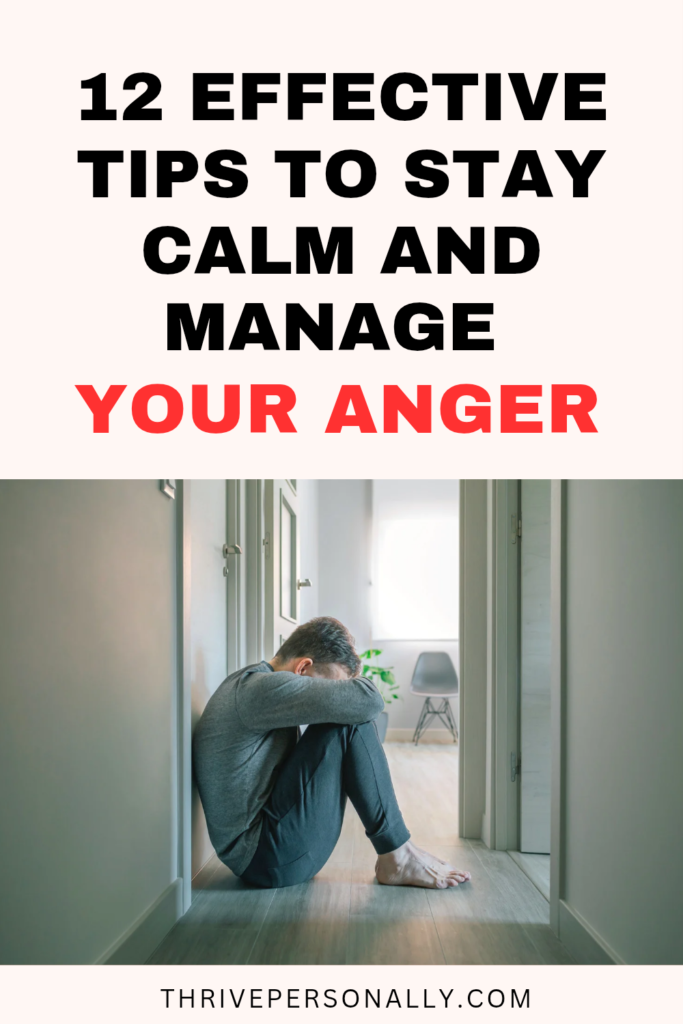Anger management is something that you’ll have to deal with throughout your entire life. Anger is just one emotion that you will feel as you experience happiness, sadness, fear, and other feelings. It’s your body’s way of telling you that something is wrong or unfair. So, if you want to know how to control your anger, you must first admit that you’re angry.
There are many things that can cause you to become angry. It can be something as small as rush hour traffic or something bigger like an argument with your spouse. Whatever it is that sets you off will be different for every person.
Also, just because everyone feels anger doesn’t mean that you won’t have anger issues. If your anger starts to control you, it can lead to aggression and other unhealthy responses. These outbursts can affect your relationships, job, and even your health.
When you allow your anger to take over, you’re susceptible to high-stress levels and anxiety. You can even develop bodily damages such as headaches and stomach problems. If you know what these symptoms can do to you, you can prevent them from happening.
12 Tips to Stay Calm and Keep Your Anger Under Control
1. Understand Your Anger Triggers
The first step to controlling your anger is to understand what triggers you. When thinking about the things that make you angry, you’ll probably notice a pattern. I know that when something upsets me, I take a minute to write down how I’m feeling.
Once you recognize your triggers, you can deal with your anger more efficiently. Take note of the situation that made you upset. Who was involved? How did you react? When you look back at these situations, you’ll notice that you probably got mad at similar things.
One way to pinpoint your anger triggers is by writing them down every time you get angry. Write down what happened before you got mad, what made you angry, and how you reacted. After recording a few anger episodes, you will begin to see what things specifically trigger you.
Maybe you get into disagreements with your boss a lot. Or whenever you don’t get the instructions done on time, you fly off the handle. Recognizing these similarities will not only help you, but allow you to change your surroundings if needed.
Read Also: 7 Simple Ways to Build Your Self-Confidence
2. Take Deep Breaths

If you feel your anger starting to build, take deep breaths. By learning how to control your breathing, you can learn how to calm down within seconds. When you take deep breaths, you force your body to stand still.
You are also helping yourself relax when you take deep breaths. Instead of focusing on what made you upset, you will focus on yourself.
Find a quiet place where you can clear your mind. You can either sit or lay down; just make sure you’re comfortable. Take a deep breath in through your nose and let your stomach puff out. Hold your breath for 3 seconds, allowing your lungs to absorb as much air as possible.
After three seconds, begin to breathe out through your mouth slowly. Visualize your anger leaving your body with every breath you release. Continue doing this for 5 minutes.
Deep breaths can help you during angry situations, but you can also use them to prevent anger. You should always try to breathe deep to better train your brain to calm yourself down. Anytime you practice deep breathing, you are forcing yourself to learn how to control your anger.
Read Also: 10 Powerful Tips to Embrace Yourself and Live Happily
3. Use Positive Self-Talk
Positive self-talk is when you tell yourself things to keep your thoughts positive. If you ever feel yourself going into an angry state, use positive self-talk. Reminding yourself that you can control your anger will help you remain calm.
Start by telling yourself things that you know will make you feel better when you’re angry. I personally like to tell myself that everything is going to be okay. But what helps you stay calm? Once you know what to say, think about things you frequently get angry about.
Say you know you get angry when people aren’t on time. Next time you’re in a situation where someone is running late, tell yourself, “I’m not going to let this bother me.”
Here are some examples of what you can say to yourself:
“I choose to stay calm.”
“This situation will pass.”
“I can control my emotions.”
By telling yourself these phrases, you allow yourself to feel powerful. You’ll want to handle each situation more peacefully and think before you let anger take over.
4. Take a Timeout
If you’re angry at someone or about something, you should take a timeout. Not only will this help you avoid saying something you’ll regret, but it will also help you cool off. You never know what you’ll say when you’re angry.
I’ve never been able to think clearly when I was angry. If you give yourself a chance to calm down, you’ll be able to think of the best solution to the problem.
Taking a timeout can be as simple as removing yourself from the situation that made you mad. You can step outside for some fresh air or go into another room. While you are in your timeout, try practicing deep breaths.
When you breathe deeply, you force your body to calm down. As you breathe in through your nose, your heart rate begins to slow down, lowering your anger level.
You can even ask yourself why you’re angry. What happened to make you upset? Was your reaction really necessary? Asking yourself these questions can help you better understand your anger.
Read Also: 7 Time-Saving Tricks for Moms Who Do It All
5. Exercise
Exercise is another great way to keep your anger under control. If you ever feel your anger levels rise, go for a walk or work out. Whenever I work out, I feel happier because my body releases happy hormones.
Any type of exercise will do, just so you get moving. Going for a walk will help clear your mind and allow you to think about something else other than what made you angry.
You can also go for a run if you want to release some of your anger. Running is a great way to let all your anger out. Plus, you’ll feel accomplished after pounding the pavement.
Dancing is another way you can move your body and keep your anger under control. Turn on your favorite song and dance like no one is watching. You’ll be so distracted by dancing you’ll forget why you were angry in the first place.
Not only will exercise keep your anger under control, but it can also prevent you from getting angry. The more you exercise, the healthier your brain and body will be.
You will be able to overcome daily stress that may cause you to become angry.
6. Practice Mindfulness and Meditation
Mindfulness and meditation are another great way to control your anger. When you are mindful, you allow yourself to know what your triggers are. You will also know how you react to these triggers and how to respond differently.
You can practice being mindful by taking deep breaths. As soon as you start to feel angry, stop what you’re doing and take a deep breath. Inhale through your nose and fill up your stomach with air.
Then, breathe out through your mouth slowly. By focusing on your breathing, you are forcing yourself to live in the present. You will also clear your mind, allowing you to think.
You should practice meditation every day, even if it’s for 5 minutes. There are many articles and videos on meditation that can help you better manage anger. Look up meditation for anger management and you’ll find tons of results.
Read Also: 8 Surprising Benefits of Meditation That Can Transform Your Life
7. Find Healthy Outlets for Your Anger
Sometimes you need to let your anger out in a healthy manner. If you keep your anger bottled up, it will only cause you problems in the future. One way you can let your anger out is by writing.
You can write down how you feel or what made you angry. You can even write a journal, poetry, or write someone a letter that you won’t send. Writing is a great way to express your anger without any consequences.
You can also let your anger out by creating art. You can doodle, paint, or draw how you feel. Many people use art as an outlet to express their anger.
Talking to someone that you trust can also be a great way to let your anger out. Talk about what made you upset, and maybe your friend can help you see things differently. Sometimes you just need to talk to someone about your problems.
Your anger shouldn’t be bottled up inside your body. Finding healthy outlets will prevent your anger from controlling you.
8. Seek Support from Others

If you’re struggling to control your anger, you should seek support from others. You should talk to someone that you trust about how you’re feeling. Letting someone else know how you feel will help you vent and understand what you’re feeling.
You can vent to your friend about something that made you angry or about everything that’s going on in your life. Sometimes just talking about how you feel can help you relieve some stress.
You never know; your friends may be able to help you with your anger problems. Sometimes when you talk to someone about your problems, they are able to provide solutions.
Other people can help you see different perspectives. Sometimes we get so caught up in our problems that we don’t see the bigger picture. Your friends and family want to help you, so don’t be afraid to ask for help.
You deserve all the support in the world when it comes to anger problems.
9. Practice Gratitude
One of the best ways to keep your anger under control is to practice gratitude. If you allow yourself to be grateful for the little things in life, you won’t get as angry. You’ll let small things go because you know that there’s always something to be grateful for.
Start a gratitude journal where you write 3 things you’re grateful for each day. You can be grateful that you woke up this morning or that you finished a task at work.
By acknowledging the good things in your life, you allow happiness to enter your life. When you’re happy, you’ll never have to worry about anger controlling you.
Read Also: 30-Day Self-Improvement Challenge
10. Let Go of Resentment
Resentment can make you angrier than you already are. If you want to better control your anger, you should let go of resentment. Letting go of resentment will allow you to live a happier life.
Ask yourself how much resentment is taking up in your body. Are you constantly thinking about the past and how people have wronged you? Is holding grudges getting you anywhere in life?
Forgive someone who has hurt you, even if it’s yourself. You can start by writing someone a letter telling them how you feel. Whether you choose to send it or not, writing this person will allow you to let go of anger.
Letting go of resentment will clear your mind and allow you to live in the present. You’ll be happier because you won’t be mad at everyone who has wronged you.
11. Set Boundaries
Anger comes when someone doesn’t respect your boundaries. If you want to control your anger, you need to set boundaries for others. Setting boundaries will allow you to prevent angry situations from happening.
First, you must recognize where you need to set boundaries. Do you constantly feel like people are taking advantage of you? Are you always the one that others go to when they need help?
After you recognize where you need to set boundaries, tell people what your boundaries are. If you need some alone time to work, tell others that you’ll be unavailable.
Remember that setting boundaries doesn’t mean you’re controlling others. You are allowing yourself to be in a position where you will not get angry.
Learn how to say no if people ask you to do something that you don’t want to do. By saying yes when you don’t want to, you’re only causing yourself anger.
12. Reflect on How You React
The last way to control your anger is by reflecting on how you react. Anger will control you if you don’t take the time to reflect on how you respond. After you get angry, ask yourself how you reacted.
Did you say something you shouldn’t have? Could you have responded to the situation differently? Maybe you became angry because you were stressed from other things.
Take a look at your anger triggers and how you respond to them. I promise once you start reflecting you’ll never have anger problems again.
Learn How To Control Anger
Everyone gets angry from time to time, but some people have anger issues. If you have trouble controlling your anger, these tips will surely help you. Once you learn how to control your anger, you’ll never want to act angry again.
Anger hurts your relationships and your health. Make today the day you take control of your anger!
Save the pin for later



